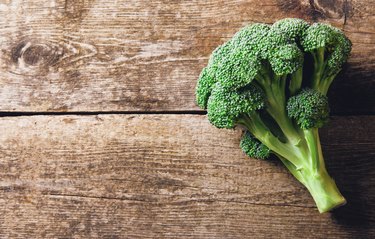
Love it or hate it, broccoli is one of the most nutritious foods you can eat. It's low in calories and high in nutrients, so you don't need to limit yourself to just one serving. However, beware broccoli recipes that call for lots of oil, butter or cheese.
Tip
A typical broccoli serving size is 1 cup.
Video of the Day
Broccoli Calories and Fiber
One serving of broccoli is one cup, raw or cooked. One cup of raw broccoli has just 35 calories, according to the USDA, which makes it a low energy-dense food. Energy density is a measurement of the amount of calories a food has per gram of weight. Low energy-dense foods are helpful for losing and maintaining your weight because you can eat more of them without going over your calorie budget.
Video of the Day
One cup of broccoli also has 2.4 grams of fiber, or "roughage." Broccoli is rich in a particular type of fiber called insoluble fiber. The body can't digest insoluble fiber, and it moves through your digestive system mainly intact.
Insoluble fiber plays an important role in digestive health because it adds bulk to your stool and helps it move more easily through the digestive tract. This promotes regularity and prevents constipation. Eating enough fiber may also help lower your risk of hemorrhoids, diverticular disease and colon cancer. Women need 25 grams of fiber each day, and men need 38 grams, according to the Dietary Guidelines 2015-2020 for Americans.
Read more: 19 High-Fiber Foods — Some May Surprise You!
Plant-Based Protein
Broccoli has only a trace of fat, but it offers a decent amount of protein for a vegetable. With about 2.5 grams per cup, roughly 30 percent of the calories in broccoli come from protein. For those who don't eat animal foods, protein-dense plant foods play a crucial role in meeting the daily recommended intake of 46 grams of protein for women and 56 grams for men.
Whether from animals or plants, your body needs the amino acids in protein to build new proteins in the body. Protein creates strong muscles and bones and supports immune function. As an enzyme, it's also necessary for the thousands of chemical reactions that take place in cells. Messenger proteins carry signals that help facilitate many different biological processes throughout the body.
Read more: How Protein Can Help You Lose More Weight
Vitamins C, K and Folate
Just one cup of broccoli provides more than half of the vitamin C an adult needs each day. Vitamin C is well-known for its role in immune system function, and it's required for the synthesis of collagen, which forms the main structural tissues of the body. It also aids wound healing and acts as an antioxidant — a substance that helps neutralize free radicals that can damage healthy cells and promote disease.
Broccoli is also a rich source of the B vitamin folate. One cup of broccoli has about 14 percent of the folate men and women need each day and almost 10 percent of the amount that pregnant women need daily. Folate is especially important for women who are pregnant or plan to become pregnant as it can reduce the risk of birth defects.
Vitamin K is abundant in broccoli, with one cup providing more than 100 percent of the recommended daily intake for women and about 83 percent of the recommended daily intake for men. Vitamin K's most important function is to encourage normal blood clotting. It's also involved in bone mineralization and turnover.
Powerful Plant Chemicals
Phytochemicals in plant foods aren't considered essential nutrients, and they aren't assigned recommended daily intakes. But they play powerful roles in human health.
Like other vegetables in the cruciferous family — cauliflower, kale, radishes and Brussels sprouts, for example — broccoli is particularly rich in sulfur-containing substances called glucosinolates. During digestion and metabolism, glucosinolates are broken down into biologically active compounds that researchers have studied for their anticancer effects, according to the National Institutes of Health.
These substances may help protect cells from DNA damage, inactivate carcinogens, induce cell death and prevent the spread of cancer cells, and provide antibacterial, antiviral and anti-inflammatory properties. However, more research is needed to confirm these effects in humans.
Healthy Preparation Tips
Don't worry about going overboard with broccoli — have it for lunch, breakfast and dinner! However, keep it healthy. Loading up your broccoli with cheese, oil or butter will defeat the purpose of including more of the veggie in your diet.
The healthiest way to prepare broccoli is simply steamed and dressed with lemon juice and fresh herbs. Broccoli can also be tossed in a small amount of olive or avocado oil and roasted in the oven, thrown in a stir fry with a little sesame oil and a lean source of protein such as tofu or chicken, or even grilled over an open fire. Raw broccoli is also a dip's best friend, so whip up a batch of low-fat Greek yogurt ranch or hummus for a healthy mid-afternoon snack.
- USDA: "Broccoli, Raw"
- USDA: "Broccoli, Cooked, Boiled, Drained, Without Salt"
- Mayo Clinic: "Weight Loss: Feel Full on Fewer Calories"
- Mayo Clinic: "Dietary Fiber: Essential for a Healthy Diet"
- NIH: "What Are Proteins and What Do They Do?"
- Dietary Guidelines for Americans: "Daily Nutritional Goals for Age-Sex Groups Based on Dietary Reference Intakes and Dietary Guidelines Recommendations"
- NIH: "Vitamin C"
- NIH: "Folate"
- NIH: "Vitamin K"
- NIH: "Cruciferous Vegetables and Cancer Prevention"
- Florida State University: “The Phytochemical Collection”